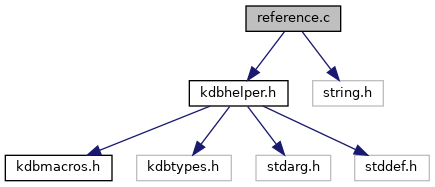Reference methods. More...
Include dependency graph for reference.c:

Functions | |
| int | elektraIsReferenceRedundant (const char *reference) |
| Check whether a reference is redundant (i.e. More... | |
| char * | elektraResolveReference (const char *reference, const Key *baseKey, const Key *parentKey) |
| Resolve reference into a full keyname. More... | |
Detailed Description
Reference methods.
- Copyright
- BSD License (see LICENSE.md or https://www.libelektra.org)
Function Documentation
◆ elektraIsReferenceRedundant()
| int elektraIsReferenceRedundant | ( | const char * | reference | ) |
Check whether a reference is redundant (i.e.
it can be expressed in less characters) or not.
This can be used to give a warning to users, because redundant references are often mistakes. Using "../some/key/../path" instead of "../some/path" may indicate, that either a mistake was made while editing, or the concept of references was misunderstood.
- Parameters
-
reference the reference to check
- Return values
-
1 if the reference is redundant 0 otherwise
◆ elektraResolveReference()
| char* elektraResolveReference | ( | const char * | reference, |
| const Key * | baseKey, | ||
| const Key * | parentKey | ||
| ) |
Resolve reference into a full keyname.
References operate like UNIX paths, with some additions:
- '.' refers to the current key
- '..' refers to the parent of the current key
- '@' refers to the parentKey of KDB
- references starting with anything but './', '../' and '@/' as absolute, only embedded '/./' and '/../' as well as '/.' and '/..' at the end will be resolved (like in any keySetName call)
- Parameters
-
reference The reference to resolve baseKey The key identified by the reference "./" parentKey The key identified by the reference "@/"
- Returns
- a newly allocated string, containing the full keyname; has to be disposed with elektraFree()